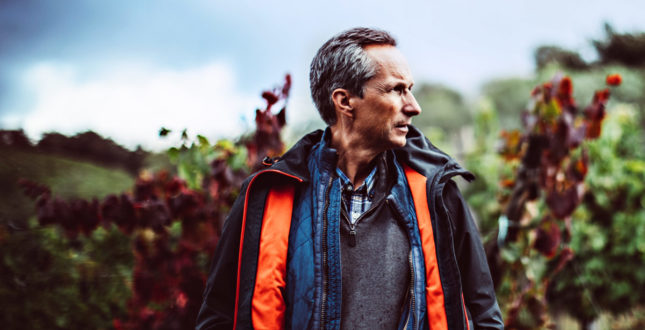Tell us about your professional journey? When and how did your love for winemaking begin?
My father is a wine-grower and wine-merchant in Saint-Emilion, and I represent the fourth generation of a family that traces its origins to Corrèze. My ancestors moved to the region to start producing and selling wine.
I took over the family business after graduating as an engineer in agricultural technology. Over the last 25 years, I have worked as an independent winemaker on family properties in Pomerol, Lalande de Pomerol and Montagne Saint-Émilion. In practice, this means I am responsible for all the winemaking and harvesting operations as well as marketing. Since 2013, I have additionally held the position of director of operations at Château Malromé.
How did this association with Château Malromé begin?
In early 2013, the Huynh family, which I am related to through marriage, asked me to advise them on the selection and acquisition of a winemaking Château in the Bordeaux region.
After a study of the estate’s development potential, especially with respect to wine production, they set their heart on Château Malromé. As the Huynh family could not physically be present on the property year-round, they decided to buy it on only one condition: that I would take charge of the winemaking operations. I welcomed the offer and accepted the position while continuing to manage my family-owned properties.
What does the position entail, in concrete terms?
As Director of Operations, I am in charge of all the aspects of production: the vines, the harvest, the staff, suppliers, service providers, etc. The main goal is to plan wine production over the long-term while maintaining and refining its quality. And when I mean long term, I’m really talking about 40 or 50 years ahead!
Bruno Lacoste, the oenologist at Malromé estate, assists me in carrying out this complex task. Year after year, we are involved in each step of the winemaking process, while taking into account the climate conditions. Only the best plots are selected to make our range of wines, and the blends vary in composition every year. Next, we proceed to the technical aspects of winemaking and maturation. Once we have made all the decisions around maceration, the right temperatures, maturation in barrels or casks, we move on to the production and bottling, which is the final stage of production! Of course, we taste at every step of the process.
What does Château Malromé’s history and its wine stand for to you?
Malromé is a historic château which has survived through the ages and has a great reputation. Its history is obviously intertwined with art, culture and gastronomy through the painter Henri de Toulouse-Lautrec. An authentic art de vivre pervades the air at the estate.
I should also mention that traces of winemaking on the estate date back to the Middle Ages, which goes to show that it is indeed a conducive location for such an endeavour!
What are the distinctive features of the Malromé vineyards?
Malromé is a vineyard of hillsides with rolling slopes, which is quite rare for the region. The land has steep slopes that allow for good natural drainage and great exposure to the sun.
Before Château Malromé was acquired by the Huynh family, the vineyards were not cultivated in any systematic manner. The property had seen no real investment for over 10 years and production quantities were thus quite low.
Since 2013, the vineyard has benefited from a number of investments, which allowed us to first upgrade the production facilities. The vat-house was revamped with state-of-the-art technical equipment, including a harvest reception facility. Many old plots were dug up and we replant every year to ensure a greater density of production and adjust the varieties we sow as per the soil types.
Right from the outset, we opted for a sustainable and environmentally-friendly approach that would respect the land and people equally. We are therefore extremely careful to select the least harmful products.
You mentioned that your job entails a lot of prospective planning. How do you see the future?
When thinking about the future, we cannot ignore the reality of climate change and the resultant rise in temperature, which is going to have a direct impact on wine production.
We have decided to plan for these changes and innovate accordingly. In fact, we have just received the necessary approvals to conduct trials with foreign varieties, such as the excellent Portuguese “Touriga Nacional”, which holds up well in heat waves and drought conditions.



